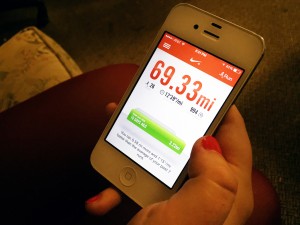Wake up. Grab coffee. Go to class. Commute home. Eat. Sleep. Repeat. The hustle and bustle of daily life can serve as one of physical health’s greatest detractors. Fortunately, the growth of mobile health, commonly know as m-health, is conveniently mobilizing information regarding activity, nutrition and even rehabilitation progress.
In promotion of the emerging field, the Boston Rehabilitation Outcomes Measurement Center, a collaboration between Boston University, Tufts University and Spaulding Rehabilitation Hospital at Harvard Medical School, is holding a Mobile Health in Rehabilitation Conference on the topic Thursday, which will be accessible to students through live streaming on the Boston ROC website.
“Mobile health is something that has been really gaining interest in all medical and public health fields,” said Mary Dawson, a research assistant at the Health and Disability Research Institute within the BU School of Public Health and an organizer of the conference. “As far as the conference objectives, we really want to increase the usage of m-health technology in the rehabilitation field. It can be used in research, and it can be used in clinical settings.”

Mobile health commonly refers to portable devices that can measure and store information for purposes of both research and self-knowledge of health outcomes. A large number of m-health technologies come in the form of cell phone apps, Dawson said.
“It’s a very new area, but we’ve seen the growth in it over the last couple of years just through things like Fitbit even,” said Mary Slavin, director of education and dissemination at BUSPH’s Health and Disability Research Institute. “The general public has access to some very effective ways to monitor physical activity [and] record and accumulate longitudinal data.”
The Boston ROC, which has held annual conferences for the past two years, selected m-health as a topic because of its alignment with the group’s greater mission: to improve measurement of rehabilitation regimes, Slavin said.
“If you’re a researcher trying to study rehabilitation, you want to learn whether or not a treatment is having effect and whether it’ll be a beneficial thing to be using in the future,” she said.
In order to discuss mobile health’s potential in the rehabilitative field, the conference will be organized into three different sections of speakers and topics: activity monitoring, assessing impairments with quality of movement and analyzing m-health instruments.
The initial section regarding activity monitoring will provide a general glance at different methodologies in mobile health, Slavin said. The presentations will then funnel into more specific impairments, such as stroke, in the second section.
Slavin said one of the main issues with dramatic recovery is context. The rise of m-health devices could resolve this issue by taking rehabilitative measures outside of the doctor’s office and into the real world.
“If you’re really good at skiing when you’re on an intermediate slope but you change the environment — throw some ice in there — and you’re terrible,” she said. “You’re the same skier, you just can’t perform that well because you haven’t trained in that way.”
The conference’s third section regarding analysis will combine the technological components of m-health devices with their potential effects, making for tangible ideas regarding the overall methodology.
“It’s a nice mix of technology and practicality,” Slavin said. “The cross between technology and rehab is giving us a whole new set of tools that are coming along with advances in the public sector, such as the incredible power of cell phones.”
Dawson said the emphasis on cell phone usage should be one reason why students would want to tune into the conference — or at least investigate the subject further.
“Because we’re so tech savvy, I think mobile health is going to be something that’s really incorporated into our generation and future generations,” she said.
And with the emergence of exercise and nutrition apps, m-health has already become a staple on the phones of some students.
“I have the Fitbit app, and I really like it,” said Olivia Sequin, a dual-degree sophomore in the School of Management and the School of Hospitality Administration. “It’s interesting because I walk so much on campus, and I get to see how many miles I go.”
But health apps may be detrimental if overused, said Sarah Nelson, a freshman in the College of Arts and Sciences. She said the WebMD app is the only health-related one on her phone.
“When you start counting every single calorie, I know that can sometimes lead to bad things,” she said. “I know that the new BU food app has calorie counters for each meal in each dining hall…which is interesting.”
Regardless, Thursday’s conference will evaluate the topic of m-health devices in a much broader context than the BU community, Slavin said.
“One of the best ways to improve is to measure yourself, and I guess that goes right back to the key component of our [Boston Rehabilitation Outcomes Measurement] Center,” she said. “If you want to change something or improve something, you really have to have the measures to see where you are.”


























































































































